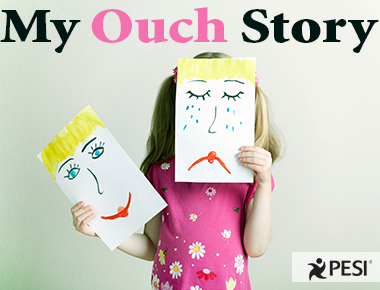My Ouch Story
CBT worksheets for children and adolescents
∞≈¿÷ ”∆µ Team

Everyone has a story to tell - but when bad things happen, it makes it much harder to tell that story because of shame, guilt, and embarrassment.
Clients look to therapists to help them develop their resilience and overcome adverse experiences. However, this task is more difficult for kids and adolescents who are still developing their vocabulary and understanding of language. A great activity to use with kids and adolescents is “My Ouch Story.”
This activity will give your young clients room to tell the story without the shame, guilt and embarrassment. Simply use the "My Ouch Story" structure with them to get started.
I remember a time when:
First:
Next, I remember:
Then:
Last:
I remember feeling:
I would like to feel:
I need:
I need this because:
I feel safe when:
These are the people in my life who support me:
When I get upset, I can do this to feel safe again:
This process helps the child map out the events leading up to certain feelings and turning them into an empowering memory that leads to resilience and growth.
Through therapy and exercises like this, the child can begin to use emotional energy in a positive way and improve relationships so they can feel accepted. Keep in mind every child‚Äôs response will differ and sometimes a response differs from what¬Ýyou think it should be.
Interested in additional practical and printable worksheets you can use to support the children you see in your practice? We've just developed a collection of designed specifically for children and adolescents that can be used to help them work through emotions, thoughts, and¬Ýfeelings, while learning how to set goals.
For the complete collection of over 200 cognitive behavioral therapy worksheets & exercises adapted just for children and adolescents, check out this popular resource: The CBT Toolbox for Children and Adolescents
Topic: Children and Adolescent Behavioral
Tags: Activity | How To | Self-Compassion | Self-Regulation | Strategies | Teens


